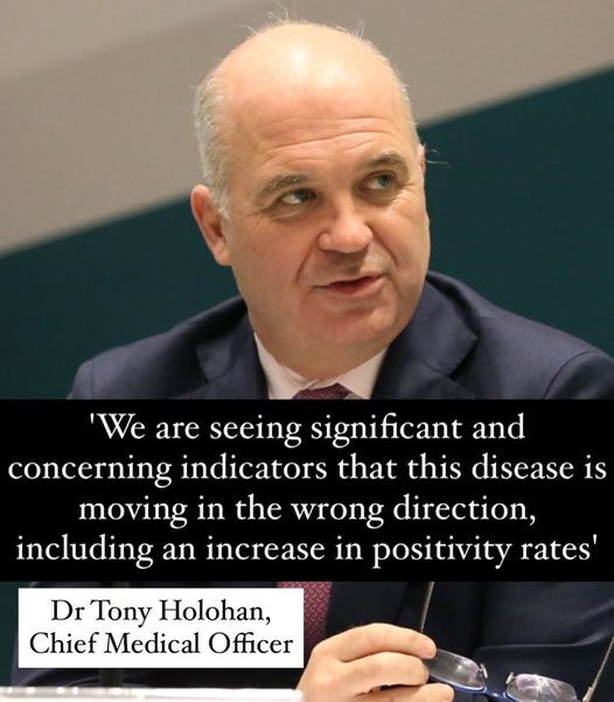The Department of Health has been notified of six further deaths of people with Covid-19 and 431 new cases.
It brings the total number of deaths in Ireland to 2,140, with 77,197 confirmed cases.
There were 22 additional hospitalisations in the past 24 hours, meaning 207 people are now in hospital with the coronavirus.
The number of patients in intensive care units stands at 30, down one from yesterday.
The 14-day incidence rate per 100,000 of the population nationally is 87.9.
Of the cases reported today, 185 are men and 244 are women, with 67% aged under 45.
The median age is 35.
134 of the cases are in Dublin, 53 in Donegal, 25 in Cavan, 24 in Louth and 22 in Mayo, with the remaining 173 infections spread across all other remaining counties.
The Chief Medical Officer said there were "significant and concerning indicators" that the disease "is moving in the wrong direction".
Dr Tony Holohan said these include an increase in positivity rates, as well as seven and 14-day incidence rates, and the five-day average has increased to 339 cases.

He said: "These trends are all the more troubling because of the delicate and precarious situation we are in.
"As a country, we are heading into a period of potential widespread inter-household and inter-generational mixing.
"This is an ideal opportunity for the virus to spread and impact on those most vulnerable to its severest effects."
Dr Holohan urged people to limit their contacts, prioritise who they meet, and "remain vigilant so we can get through this together" as "recent international experience has demonstrated just how quickly this disease can get out of control."
He said the National Public Health Emergency Team (NPHET) will meet tomorrow to review the epidemiological situation.
Chair of NPHET's Epidemiological Modelling Advisory Group Professor Philip Nolan said we could see an increase in Covid-19 cases in January but that that was not an inevitable scenario.
Prof Nolan said it depends on what people do now and "if we're not exceptionally careful we will be in difficulty in January".
He said at the moment we are seeing a rise in case numbers which health officials think is related to the easing of restrictions in early December.
However, Prof Nolan said it was possible to avoid a surge in January if everyone is "scrupulous" in their behaviour and in following public health measures.
He said if people make every effort to limit their contacts, even as restrictions ease further on Friday, it is possible to keep the 'R' number around 1.2 which would result in 400-500 cases per day in January.
If the 'R' number were to rise to around 1.6, he said cases could be north of 1,200 per day in the first or second week of January.
He said that it wasn't just the easing of restrictions that resulted in a rise in cases numbers but a combination of factors such as how people respond to and comply with restrictions and most importantly, he said, how individual members of the public appreciate the risk.
He said an increase in contacts would lead to an increase in case numbers and the time to be careful was before case numbers go up.
In relation to the call to delay Christmas gatherings, he said he had his doubts about whether the public would respond to such a measure.
Prof Nolan said with public health advice there has to be public buy-in to the advice and to the restrictions.
He said within the existing measures there was hope that people would appreciate that if they socialise too much that we would end up paying for it with case numbers and hospitalisations in January.
We need your consent to load this rte-player contentWe use rte-player to manage extra content that can set cookies on your device and collect data about your activity. Please review their details and accept them to load the content.Manage Preferences
Separately, when asked if people should travel to Northern Ireland at Christmas, public health expert Dr Gabriel Scally said people should think twice, or three times about travelling anywhere.
If people needed a lesson how not to do it, he added, they should look at what happened after Thanksgiving in the US. And he said we did not want a repeat of that, "north or south".
Professor Scally said multi-generational gatherings should be postponed to the Spring or better still, to the summer. "We should be keeping ourselves to ourselves", he said.
He said it was only for a few months; there was a vaccine on the way which was going to save an enormous number of lives. Relaxing restrictions now could cost lives, he said, and he warned the virus does not go to sleep over Christmas.
Meanwhile, in Northern Ireland, a further eight people with Covid-19 have died, bringing the total there to 1,143.
Another 510 new cases of the disease have also been confirmed from tests on 3,242 individuals, taking the cumulative total to 59,631.
There are 457 confirmed Covid-19 patients in hospital, with 32 in ICU, 25 of whom are on ventilators.
Additional reporting Ciara Ní Bhroin, Orla O'Donnell

